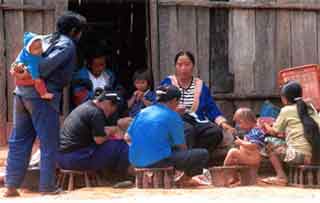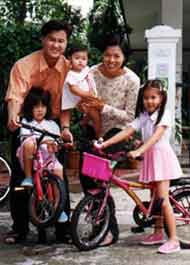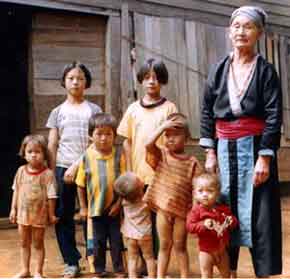Talking About Family Values
A friend once asked me what one of the most valuable aspects of Thai society is. I replied without hesitation, “The sense of community and family.” There are exceptions to every rule, but in general family is the backbone of life in Thailand.
It is not a career, a mortgage payment, or striking it out on your own that comes first: it is your brethren. Teenagers typically do not sit around counting the days until they can leave the nest. Generations often live under one roof. If families move apart, close ties and financial and emotional support are maintained. This strong and extended family unit offers security to each member.
There are cases of parents abusing, abandoning, and forcing their children into labour in Thailand. But for the healthy and functional Thai family, children are cherished and spoiled by their parents. They are usually raised with the help of the extended family. They are seen as future caregivers and breadwinners. Children respect their elders, and each family member knows their own place within the hierarchy of the family and the duties that come with their position. When children mature, taking care of their parents is not a burden; it is viewed as an honour.
each family member knows their own place within the hierarchy of the family and the duties that come with their position. When children mature, taking care of their parents is not a burden; it is viewed as an honour.
I spoke to a 23-year-old reporting specialist named Mr. Natawood regarding Thai family values. He is of Chinese descent and is on the conservative and traditional side of the younger Thai generation.
He lives with his mother (50), father (53), and three sisters (18, 20, and 25) in an apartment building in Bangkok. His family resides in apartment #1, his grandmother and grandfather live in apartment #2, and his aunts and uncles live in apartment #5.
His older sister works and his younger sisters are studying at universities. Their apartment has three bedrooms. He shares one bedroom with his three sisters, his parents sleep in the other, and one bedroom is vacant. He says he enjoys talking with his sisters before they fall asleep at night. Privacy is not as cherished as it is in the West.
not as cherished as it is in the West.
Each child has chores to do around the house. Mr. Natawood is in charge of taking out the garbage, polishing everyone’s shoes, cleaning the downstairs floor, and washing the car.
Mr. Natawood returns home every day after work. His mother cooks breakfast, lunch, and dinner for their family and he states, “Her food is delicious and cleaner than what you can buy outside. I like to go home and eat with my family. After dinner, we all have a family meeting and talk about our day and watch television together.” On weekends, the entire extended family goes to a restaurant and talks about politics, how they are doing, and their personal concerns.
Mr. Natawood gives one-third of his income to his parents and the rest he uses or saves for himself. His father is the financial manager of the household. If Mr. Natawood marries one day, his wife will come and live at his parents’ home. If his sisters marry, they will leave and join their husband’s home.
husband’s home.
I asked what happens when there is a disagreement within the family. He stated, “We all sit down and talk about it. We define the problem and then my parents explain through examples and reason why it should or should not be that way. If I disagree with them, I must have many good reasons why. I follow their rules. They understand. They want the best for me. My parents are wise. If they do not know the answer to my questions or problems, they consult with my relatives.”
Even while he was studying at university, Mr. Natawood rarely went out at night. He stated, “I don’t want to make my parents worry about me, so I am a good boy.” When his mother fell severely ill eight years ago, he was terrified. When he asked his father to quit smoking, he took his son’s advice.
When asked how he felt about many people in the West placing their parents in nursing homes he said, “Foreigners live more independently. They do not take care of their parents. I don’t know why. You have a different culture. We must take care. Our parents raise us, feed us, and provide us with education. When they get old, they no longer have strength. Nursing homes are not a good place. The people do not know each other and they want to be with their families. We live together and we know each other. If you go and live with strangers, you have problems. My parents know that we will take care of them.” I think of the comfort Mr. Natawood’s parents must feel in knowing this.
I am now 30 years old and my husband is 36. We have no children. Most people say “But you are going to be alone when you get old!” Well, I look around and see plenty of parents living alone regardless of how many children they have.
Mr. Natawood states, “You only have one mother and one father in the world. I want to live with them.” I hope that as modernization and globalization catch up with Thailand, families will continue to hold on to each other and their beliefs. I hope that when I am old and gray someone will hold on to me too.
